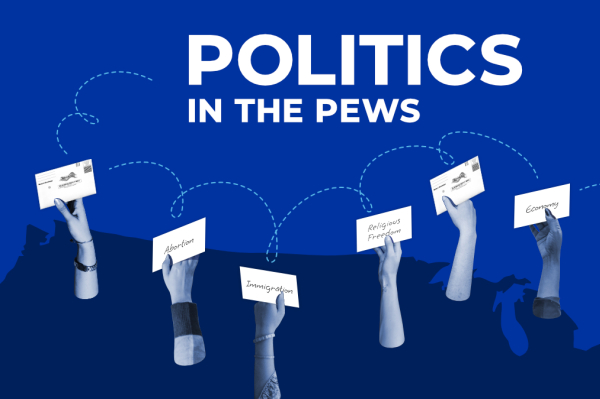America's 'Values' Voters Stand Out
WASHINGTON – Conservative social-issue voters will descend on the nation's capital Friday to hear Republican presidential contenders and a Democratic candidate speak about their social values. And these social-issue voters have distinctive characteristics such as being religious, Republican and conservative, according to a Pew analysis this week.
Nearly half (43 percent) of Republican voters, many of whom are conservative Christians, say social issues will be very important in their vote for president – a higher proportion than the general public who care more about the Iraq war and domestic issues such as the economy and health care, according to the Pew Forum on Religion & Public Life.
But Republican social-issue voters differ in many ways even from other GOP voters. For instance, they are more religious and more conservative than other Republicans. This group is also somewhat less likely than others in their political party to express a positive view of current Republican frontrunner Rudy Giuliani.
According to Pew, white evangelical Protestants compose 37 percent of all Republican voters and a majority (55 percent) of Republican social-issue voters. Smaller percentages consists of white mainline Protestants (13 percent) or white non-Hispanic Catholics (14 percent).
Republican social-issue voters are more likely to be involved in church activities with seven out of ten attending religious services at least once a week – or nearly double the rate of other Republican and Republican-leaning voters (39 percent).
However, social-issue voters tend to be less educated and less affluent compared to overall Republican voters. Half of them (51 percent) said they are part of the working class, compared with 38 percent among other Republican voters. Social-issue voters also were more likely to be women (52 percent) than among other Republican voters (42 percent).
More strikingly, a full 80 percent, or four-in-five social-issue voters, say they are politically conservative, a level 20 points higher than among other Republican voters (58 percent).
In particular, social-issue voters are much more conservative than other Republicans and Republican-leaning voters on issues such as abortion, stem cell research, and gay "marriage."
More than eight in ten (81 percent) social-issue voters oppose legalized abortion in most or all cases, with 41 percent saying abortion should be illegal in all cases. There was less consensus among other Republicans with only 42 percent saying abortion should be illegal in all or most cases.
In terms of allowing homosexual people to "marry," over 90 percent of social-issue voters are opposed, with 70 percent strongly opposed. In comparison, only 63 percent of other Republicans are opposed, with only 29 percent strongly opposed to gay "marriage."
A marked difference of 41 points between Republican social-issue voters and other Republicans separate those from each group who said they are strongly opposed to gay "marriage."
Meanwhile, two in three social-issue voters oppose stem cell research compared to 38 percent of other Republicans.
On the candidates themselves, social-issue voters and other Republicans tend to have similar views on the current Republican presidential contenders with the exception of former New York City mayor Rudy Giuliani. A ten point difference separates the two groups with other Republicans tending to have a more favorable view of Giuliani (88 percent v. 78 percent).
Fred Thompson is the current favorite among social-issue voters with 90 percent of this group having a favorable view of the former Tennessee senator.
President George W. Bush is also viewed favorably by 86 percent of social-issue voters.
"Though social-issue voters clearly are distinctive in several ways, the exact nature of their impact on the GOP nominating process is unclear," Pew noted. "Whether they will unite behind a particular candidate, and how this might affect the Republican nomination process and ultimately the general election, remains to be seen."
Participants of the Oct. 19-21 "Values Voters Summit," sponsored by the Family Research Council, will feature the qualities described in Pew's recent survey.
Those at the values voter summit will look for a candidate who shares similar values, which for most include pro-life, pro-marriage, and pro-family principles.
The event is said to be the largest nationwide gathering of values voters and will feature all the Republican presidential candidates as well as Democratic contender Bill Richardson. It also provides a straw poll that will be announced late Saturday of who social conservatives are currently leaning towards.
Tony Perkins, president of Family Research Council, predicts at least one candidate will emerge from the Values Voter Summit with major support from social conservatives, who thus far have failed to rally behind a single candidate





















